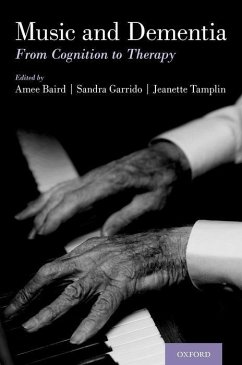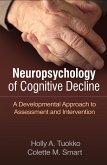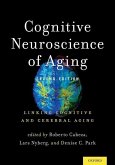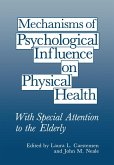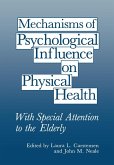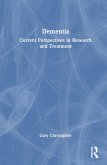Music & Dementia C
Herausgeber: Baird, Amee; Tamplin, Jeanette; Garrido, Sandra
Schade – dieser Artikel ist leider ausverkauft. Sobald wir wissen, ob und wann der Artikel wieder verfügbar ist, informieren wir Sie an dieser Stelle.
Music & Dementia C
Herausgeber: Baird, Amee; Tamplin, Jeanette; Garrido, Sandra
- Gebundenes Buch
- Merkliste
- Auf die Merkliste
- Bewerten Bewerten
- Teilen
- Produkt teilen
- Produkterinnerung
- Produkterinnerung
Dementia is a significant health issue facing our aging population. Although there is no known cure, there is increasing evidence that music is an effective treatment for various symptoms of dementia. Music therapy and musical activities can have widespread benefits for people with dementia and their caretakers, including triggering memories, enhancing relationships, reducing agitation, and improving mood. This book outlines the current research on music and dementia from internationally renowned music therapists, music psychologists, and clinical neuropsychologists.
Andere Kunden interessierten sich auch für
![Neuropsychology of Cognitive Decline Neuropsychology of Cognitive Decline]() Holly A TuokkoNeuropsychology of Cognitive Decline67,99 €
Holly A TuokkoNeuropsychology of Cognitive Decline67,99 €![Cognitive Neuroscience of Aging Cognitive Neuroscience of Aging]() Cognitive Neuroscience of Aging247,99 €
Cognitive Neuroscience of Aging247,99 €![Care-Giving In Dementia 2 Care-Giving In Dementia 2]() Care-Giving In Dementia 2166,99 €
Care-Giving In Dementia 2166,99 €![Mechanisms of Psychological Influence on Physical Health Mechanisms of Psychological Influence on Physical Health]() Laura L. CarstensenMechanisms of Psychological Influence on Physical Health100,99 €
Laura L. CarstensenMechanisms of Psychological Influence on Physical Health100,99 €![Mechanisms of Psychological Influence on Physical Health Mechanisms of Psychological Influence on Physical Health]() Laura L. CarstensenMechanisms of Psychological Influence on Physical Health38,99 €
Laura L. CarstensenMechanisms of Psychological Influence on Physical Health38,99 €![Ageing and Older Adult Mental Health Ageing and Older Adult Mental Health]() Ageing and Older Adult Mental Health151,99 €
Ageing and Older Adult Mental Health151,99 €![Dementia Dementia]() Gary ChristopherDementia157,99 €
Gary ChristopherDementia157,99 €-
-
Dementia is a significant health issue facing our aging population. Although there is no known cure, there is increasing evidence that music is an effective treatment for various symptoms of dementia. Music therapy and musical activities can have widespread benefits for people with dementia and their caretakers, including triggering memories, enhancing relationships, reducing agitation, and improving mood. This book outlines the current research on music and dementia from internationally renowned music therapists, music psychologists, and clinical neuropsychologists.
Produktdetails
- Produktdetails
- Verlag: Oxford University Press
- Seitenzahl: 324
- Erscheinungstermin: 16. September 2019
- Englisch
- Abmessung: 237mm x 160mm x 26mm
- Gewicht: 624g
- ISBN-13: 9780190075934
- ISBN-10: 0190075937
- Artikelnr.: 57008989
- Herstellerkennzeichnung
- Libri GmbH
- Europaallee 1
- 36244 Bad Hersfeld
- gpsr@libri.de
- Verlag: Oxford University Press
- Seitenzahl: 324
- Erscheinungstermin: 16. September 2019
- Englisch
- Abmessung: 237mm x 160mm x 26mm
- Gewicht: 624g
- ISBN-13: 9780190075934
- ISBN-10: 0190075937
- Artikelnr.: 57008989
- Herstellerkennzeichnung
- Libri GmbH
- Europaallee 1
- 36244 Bad Hersfeld
- gpsr@libri.de
Dr. Amee Baird completed a PhD and Master of Clinical Neuropsychology at The University of Melbourne. She has worked as a clinical neuropsychologist in both clinical and research positions, including at the National Hospital for Neurology and Neurosurgery in London. Her current research focuses on the relationship between music, memory, and the self in people with dementia. She has published on a wide range of topics including her forthcoming book Sex in the Brain (NewSouth Publishing and Columbia University Press, 2019). Dr. Sandra Garrido completed her PhD at the University of New South Wales. Her post-doctoral research at The University of Melbourne concerned the relationship between music and mental health. She is currently based at the MARCS Institute for Brain, Behaviour and Development at Western Sydney University, and has over 70 academic publications including a monograph entitled Why Are We Attracted to Sad Music? (Palgrave Macmillan, 2017). Dr. Jeanette Tamplin completed her PhD at The University of Melbourne where she is currently a Senior Research Fellow and also holds a clinical music therapy position at Austin Health. Her research and clinical practice focus on music therapy in neurorehabilitation. She is widely published and co-authored Music Therapy Methods in Neurorehabilitation (Jessica Kingsley Publishers, 2006).
* Preface - Amee Baird, Sandra Garrido and Jeanette Tamplin
* Part I: Why music for people with dementia?
* 1. Amy Clements-Cortes: Understanding the continuum of musical
experiences for persons with dementia
* 2. Matthieu Ghilain, Loris Schiaratura, Micheline Lesaffre and
Severine Samson: Is music special for people with dementia?
* 3. Olivia Brancastisano and William F. Thompson: Seven capacities of
music that underpin its therapeutic value in dementia care
* Part II: Impact of music on cognition and emotion in people with
dementia
* 4. Ashley Vanstone and Lola Cuddy: Melody, memory, and engagement in
Alzheimer's disease
* 5. Rohani Omar: Music cognition in frontotemporal dementia and
non-Alzheimer's dementias
* 6. Teppo Sarkamo: Musical leisure activities to support cognitive and
emotional functioning in aging and dementia: A review of current
evidence
* 7. Sandra Garrido: Musical playlists for addressing depression in
people with dementia
* 8. Amee Baird and William F. Thompson: Preserved musical instrument
playing in dementia: a unique form of access to memory and self
* Part III: Music Therapy in dementia care
* 9. Becky Dowson and Orii McDermott: Approaches to measuring the
impact of music therapy and music activities on people with dementia
* 10. Anne Lipe and Molly Edmonston: Music and music therapy
interventions for behavioural and psychological symptoms of dementia:
An umbrella review and recommendations for best practice
* 11. Hanne Mette Ridder and Julie Ørnholt Bøtker: Music therapy and
skills sharing to meet psychosocial needs for people with advanced
dementia
* 12. Melissa Mercadel-Brotons: Music interventions for advanced
dementia: Needs and clinical interventions identified from a
narrative synthesis systematic review
* 13. Jeanette Tamplin and Imogen N Clark: Therapeutic music
interventions to support people with dementia living at home with
their family caregivers
* Future directions - Amee Baird, Sandra Garrido and Jeanette Tamplin
* Part I: Why music for people with dementia?
* 1. Amy Clements-Cortes: Understanding the continuum of musical
experiences for persons with dementia
* 2. Matthieu Ghilain, Loris Schiaratura, Micheline Lesaffre and
Severine Samson: Is music special for people with dementia?
* 3. Olivia Brancastisano and William F. Thompson: Seven capacities of
music that underpin its therapeutic value in dementia care
* Part II: Impact of music on cognition and emotion in people with
dementia
* 4. Ashley Vanstone and Lola Cuddy: Melody, memory, and engagement in
Alzheimer's disease
* 5. Rohani Omar: Music cognition in frontotemporal dementia and
non-Alzheimer's dementias
* 6. Teppo Sarkamo: Musical leisure activities to support cognitive and
emotional functioning in aging and dementia: A review of current
evidence
* 7. Sandra Garrido: Musical playlists for addressing depression in
people with dementia
* 8. Amee Baird and William F. Thompson: Preserved musical instrument
playing in dementia: a unique form of access to memory and self
* Part III: Music Therapy in dementia care
* 9. Becky Dowson and Orii McDermott: Approaches to measuring the
impact of music therapy and music activities on people with dementia
* 10. Anne Lipe and Molly Edmonston: Music and music therapy
interventions for behavioural and psychological symptoms of dementia:
An umbrella review and recommendations for best practice
* 11. Hanne Mette Ridder and Julie Ørnholt Bøtker: Music therapy and
skills sharing to meet psychosocial needs for people with advanced
dementia
* 12. Melissa Mercadel-Brotons: Music interventions for advanced
dementia: Needs and clinical interventions identified from a
narrative synthesis systematic review
* 13. Jeanette Tamplin and Imogen N Clark: Therapeutic music
interventions to support people with dementia living at home with
their family caregivers
* Future directions - Amee Baird, Sandra Garrido and Jeanette Tamplin
* Preface - Amee Baird, Sandra Garrido and Jeanette Tamplin
* Part I: Why music for people with dementia?
* 1. Amy Clements-Cortes: Understanding the continuum of musical
experiences for persons with dementia
* 2. Matthieu Ghilain, Loris Schiaratura, Micheline Lesaffre and
Severine Samson: Is music special for people with dementia?
* 3. Olivia Brancastisano and William F. Thompson: Seven capacities of
music that underpin its therapeutic value in dementia care
* Part II: Impact of music on cognition and emotion in people with
dementia
* 4. Ashley Vanstone and Lola Cuddy: Melody, memory, and engagement in
Alzheimer's disease
* 5. Rohani Omar: Music cognition in frontotemporal dementia and
non-Alzheimer's dementias
* 6. Teppo Sarkamo: Musical leisure activities to support cognitive and
emotional functioning in aging and dementia: A review of current
evidence
* 7. Sandra Garrido: Musical playlists for addressing depression in
people with dementia
* 8. Amee Baird and William F. Thompson: Preserved musical instrument
playing in dementia: a unique form of access to memory and self
* Part III: Music Therapy in dementia care
* 9. Becky Dowson and Orii McDermott: Approaches to measuring the
impact of music therapy and music activities on people with dementia
* 10. Anne Lipe and Molly Edmonston: Music and music therapy
interventions for behavioural and psychological symptoms of dementia:
An umbrella review and recommendations for best practice
* 11. Hanne Mette Ridder and Julie Ørnholt Bøtker: Music therapy and
skills sharing to meet psychosocial needs for people with advanced
dementia
* 12. Melissa Mercadel-Brotons: Music interventions for advanced
dementia: Needs and clinical interventions identified from a
narrative synthesis systematic review
* 13. Jeanette Tamplin and Imogen N Clark: Therapeutic music
interventions to support people with dementia living at home with
their family caregivers
* Future directions - Amee Baird, Sandra Garrido and Jeanette Tamplin
* Part I: Why music for people with dementia?
* 1. Amy Clements-Cortes: Understanding the continuum of musical
experiences for persons with dementia
* 2. Matthieu Ghilain, Loris Schiaratura, Micheline Lesaffre and
Severine Samson: Is music special for people with dementia?
* 3. Olivia Brancastisano and William F. Thompson: Seven capacities of
music that underpin its therapeutic value in dementia care
* Part II: Impact of music on cognition and emotion in people with
dementia
* 4. Ashley Vanstone and Lola Cuddy: Melody, memory, and engagement in
Alzheimer's disease
* 5. Rohani Omar: Music cognition in frontotemporal dementia and
non-Alzheimer's dementias
* 6. Teppo Sarkamo: Musical leisure activities to support cognitive and
emotional functioning in aging and dementia: A review of current
evidence
* 7. Sandra Garrido: Musical playlists for addressing depression in
people with dementia
* 8. Amee Baird and William F. Thompson: Preserved musical instrument
playing in dementia: a unique form of access to memory and self
* Part III: Music Therapy in dementia care
* 9. Becky Dowson and Orii McDermott: Approaches to measuring the
impact of music therapy and music activities on people with dementia
* 10. Anne Lipe and Molly Edmonston: Music and music therapy
interventions for behavioural and psychological symptoms of dementia:
An umbrella review and recommendations for best practice
* 11. Hanne Mette Ridder and Julie Ørnholt Bøtker: Music therapy and
skills sharing to meet psychosocial needs for people with advanced
dementia
* 12. Melissa Mercadel-Brotons: Music interventions for advanced
dementia: Needs and clinical interventions identified from a
narrative synthesis systematic review
* 13. Jeanette Tamplin and Imogen N Clark: Therapeutic music
interventions to support people with dementia living at home with
their family caregivers
* Future directions - Amee Baird, Sandra Garrido and Jeanette Tamplin

